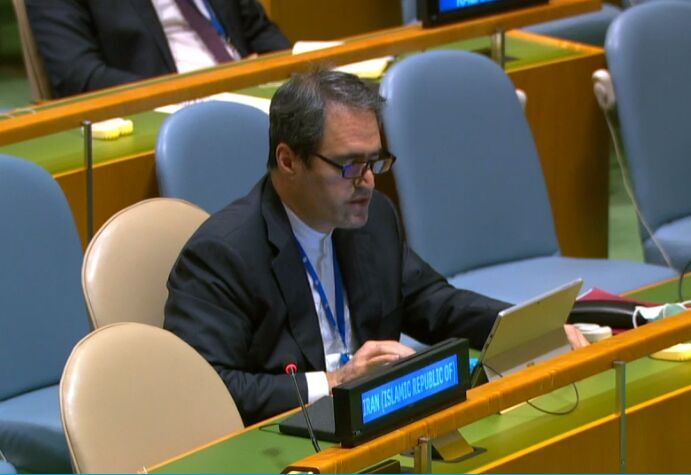
Baloji made the remarks at a meeting of the UN General Assembly's disarmament committee in response to comments made by the German envoy and resigned Yemeni government.
He said: "I will not delve deeply into the absurdities that representative of Yemen mentioned about Iran. As they do not warrant serious consideration and we reject them. Just I want to remind that nothing can justify this degree of breach of International human rights and International Humanitarian Law and it is a great regret that they acknowledge they have invited another country to intervene militarily in their country and they are not asking them to stop bombing and imposing economic pressure which has caused the most severe human crisis in the history to happen in Yemen.
In addition I want to reflect on another issue that in the course of our deliberations, a few countries including Germany have raised concerns about Iran’s ballistic-missile programme. They have also argued that Iran’s ballistic missile launches are inconsistent with resolution 2231 (2015). I am therefore taking the floor to make some comments to clarify that issue. In fact, our defensive posture stems from sober geostrategic calculation and moral and religious convictions, and also based on significant historical experience. During Saddam Hussein’s aggression against Iran, he rained missiles on our cities, some of which carried chemical components that were provided by certain Western countries including particularly the United States and Germany. As a result of these attacks, other than tens of hundreds of innocent Iranian people who died directly, 100000 fell victims who are still suffering. Germany must be held accountable to its role in assisting Saddam to equip with chemical weapons and committing war crimes and crimes against humanity.
However, Iran was actively prevented from purchasing even the most rudimentary means of self-defence to at least deter the aggressor. The application of such restrictions against Iran by all Western countries still continues. In addition to Saddam’s aggression, which was effectively backed by the United States and its regional allies, Iran has been subject to American military interventions on a few occasions over the past 40 years. During those decades, we were also faced with persistent United States threats, especially through its outdated mantra that all options are on the table. We should also recall that for many years, certain countries in the region have been calling on the United States to attack Iran. Further, we also like to refer to Israel’s decades of threats against Iran, the most recent of which was using nuclear weapons and threatening Iran with nuclear annihilation. That is definitely wishful thinking. We have therefore learned our lesson by having to deal with persistent restrictions on obtaining essential defensive weapons, on the one hand, and with defending our nation against continued foreign threats on the other. We learned that no Iranian Administration can leave its people defenseless in a region as volatile as the Persian Gulf. Our main responsibility is to protect our citizens. We have therefore developed our own indigenous missile defence system, which is a legitimate and lawful programme and our inherent right under Article 51 of the Charter of the United Nations. It is worth mentioning that our entire defence expenditure is a fraction of that of United States clients in our neighbourhood, who race to buy hundreds of billions of dollars’ worth of the most sophisticated weaponry, including long-range missiles. With regard to the role of missiles in its defence posture, Iran’s missile programme is a conventional defensive capability. Its missiles are for defensive purposes only and are an effective means of deterrence against foreign threats. Iran’s conscious decision to focus on precision rather than range has afforded us the capability to strike back with pinpoint accuracy. Nuclear weapons do not need to be precise, but conventional warheads do. The only use that Iran has made of missiles since the beginning of the eight-year war imposed on us has been a limited and measured military action in legitimate self-defence. Efforts to portray Iran’s ballistic missiles as a regional threat are therefore a deceptive and hostile policy.
Finally, with regard to the arguments about the relationship between resolution 2231 (2015) and Iran’s ballistic-missile launches, the resolution only “calls upon” Iran not to undertake any activity related to ballistic missiles “designed” to be capable of delivering nuclear weapons. Iran has repeatedly stated that none of its ballistic missiles have been designed to have such a capability. We respect resolution 2231 (2015) and we respect our international commitments."
7129**1424
Follow us on Twitter @IrnaEnglish
IRNA English solhkhabar | Peace International News Agency Peace International News Agency , Peace News , International Agency News of Peace
solhkhabar | Peace International News Agency Peace International News Agency , Peace News , International Agency News of Peace